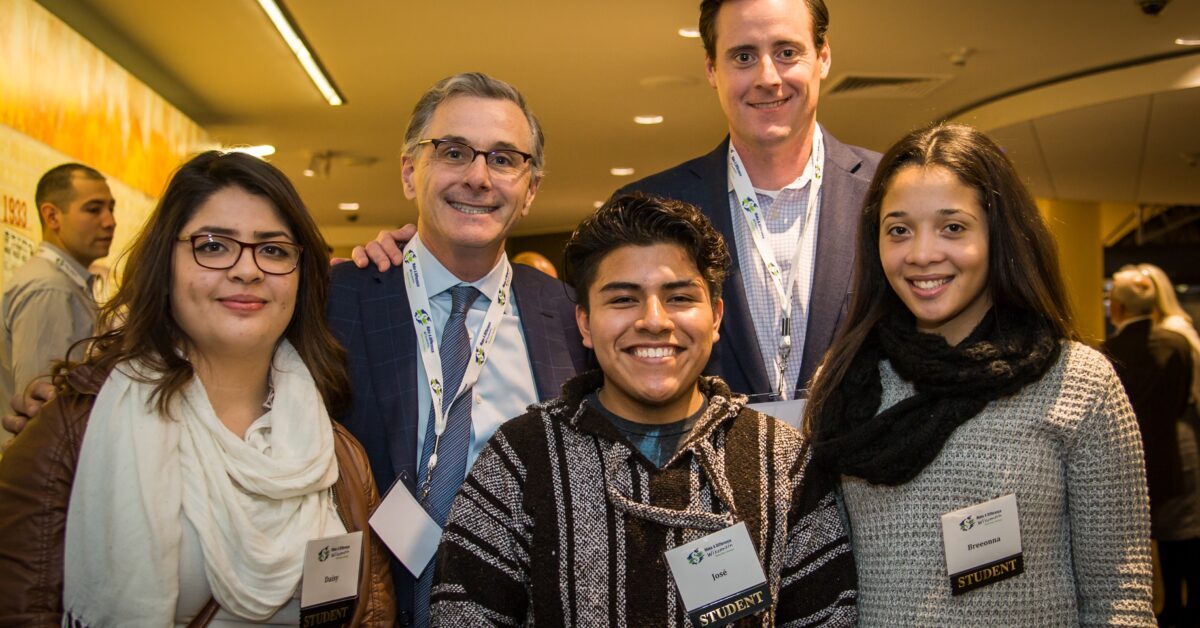“My Mother Was My Make A Difference”: Life and Money Insights from Jamie Dinan, Milwaukee Bucks Owner & Successful Hedge Fund Manager
November 5, 2015

Money smarts matter, whether you’re a successful hedge fund manager from New York City, pro basketball player in Philadelphia or an aspiring chef starting college from the southside of Milwaukee.
Successful New York-based hedge fund manager and new Milwaukee Bucks co-owner Jamie Dinan, along with team CFO Patrick McDonough shared insights on success, life and money as guests of honor at the annual Make A Difference – Wisconsin Appreciation Reception and awards event Oct. 29 at MillerCoors. Dinan and McDonough are both East Coast natives, now with a unique and energizing role in Milwaukee’s future via the Bucks NBA franchise.
Based in part on their roles, we invited both leaders to participate in our event, including a sit-down with three engaging teens from our Money Coach financial education program. Our three Money Coach teens – Daisy, José and Breeonna – peppered Dinan and McDonough with thought-provoking questions on money skills, career advice and giving back. McDonough encouraged each teen to “surround yourself with smart people” as they continue in their education and jobs. Dinan emphasized his belief that sound personal finance equated to “personal freedom” and lauded the career interests of Breeonna (nursing), Daisy (pharmacist) and José (chef). His big takeaway when it comes to work and life? “Happiness comes from within.”
During Dinan’s keynote, he touched on many of those same themes, as well as other ways financial education is vital both in our high schools and on the hardwood. What follows are takeaways from Dinan’s keynote.
On money lessons while growing up: “I grew up in Worcester (Massachusetts), an old mill town, not unlike Milwaukee … I had a wonderful upbringing, though money was tight. My mother … was my Make a Difference – Wisconsin. She’s the one who took me to the bank to open my first savings account. And that’s when they paid real interest, so it was fun to take your passport and see how much money I had made … I had a lot of really crappy jobs as a teenager – I seemed to specialize in the worst jobs – and I made something like $2.25 an hour, though back then, $2.25 really got you something. I’d make about $100 a week in my summers when I was 15, 16 and 17, and I’d go to the bank and deposit that entire check. Then I’d never touch it. In many ways, that thriftiness was instilled in me because money was tight and it’s stayed with me even today. I think about what things cost. I guess I’m still that kid where I think it’s okay to spend money but it’s stupid to waste money. You can really extrapolate those skills long after your situation has changed. It makes you, in my opinion, a better person.”
On the stability financial skills bring: “Programming of mentoring basic financial literacy skills to your community’s teenagers and young adults is absolutely critical to their future stability and success. I think all of you in this room get that. We take so many of these things for granted. We assume, everyone understands a budget, everyone understands you go to the bank instead of a check cashing store. But what we forget is that we are so privileged [and may] take for granted what so many others have no idea. You change lives. … Every kid that you connect with, you make a difference to that kid and that’s really important.”
On the impact of financial skills for Wisconsin teens and young NBA superstars: “In the NBA, we actually have millionaire at-risk kids in many ways. Here are young adults, mostly African American, with some education, though very few from what we’d call middle class backgrounds, all of a sudden waking up at 18, 19 0r 20 years old and they’re millionaires. Their financial skills, even their life skills, are incredibly limited. We recognize that. My partners and I have really decided to we help these kids. We have a tremendous responsibility to these great kids, our players. We view them as our family. … We’ve started financial training for players, internships at our firms and in one case one of the player’s sisters got an internship at one of our firms. … It’s like with every one kid you mentor or tutor. There’s a synergistic effect. I’d bet that every one kid turns into 5 or 10 people, people who would never know of you and you would never know of them.”
On positive money role models in the NBA: “There are good examples out there. Our point guard, Michael Carter-Williams, when he made his start with the Philadelphia 76ers, he publically acknowledged all his money was going into a trust fund. He didn’t touch a single penny of that. All of his spending money comes from whatever he makes in endorsements, sponsorships. This is like everyone here, saving what you can – not just for a rainy day, but for retirement.”
-Transcribed and Intro by Justin Kern, Make A Difference Marketing and Communications Manager
